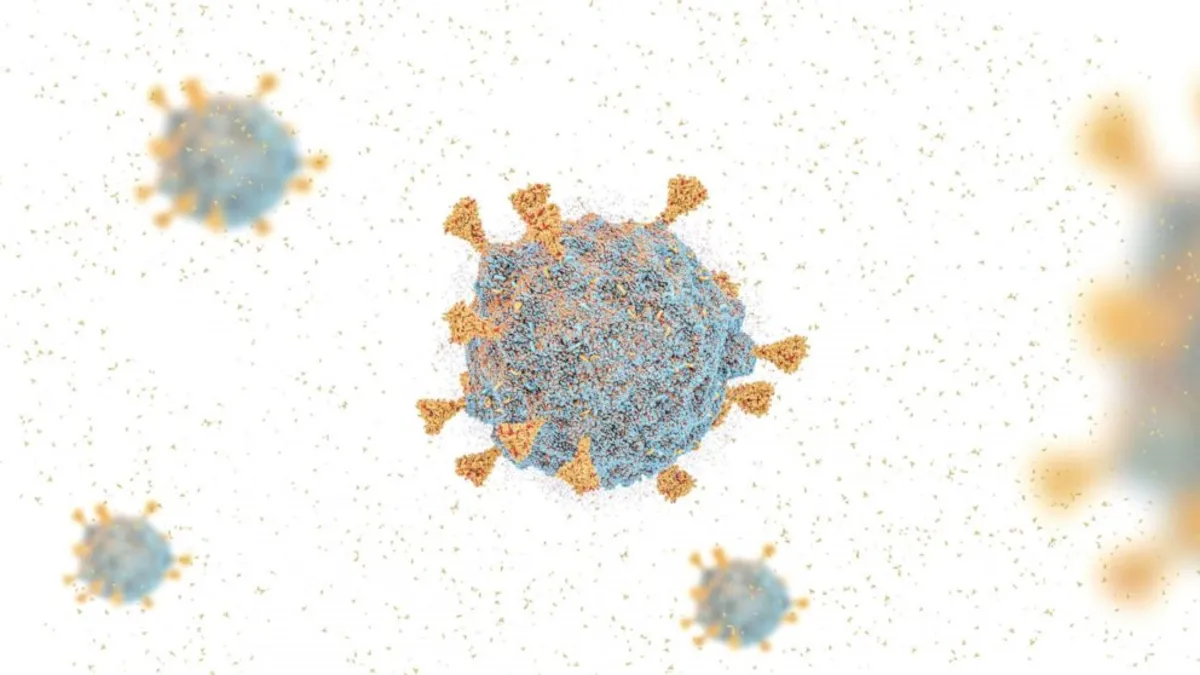
A newer COVID-19 variant, designated as NB.1.8.1, may be associated with severe sore throat symptoms in some individuals infected with the virus. This variant has gained the nickname razor blade throat due to the intense pain reported by affected individuals. According to data from the global genome sequencing database, GISAID, NB.1.8.1 has been identified in multiple states across the United States, including New York, Illinois, Texas, and California.
The variant NB.1.8.1 is classified as a descendant of the recombinant variant XVD.1.5.1, which itself is related to the Omicron variant. The World Health Organization (WHO) reported that the first sample of NB.1.8.1 was collected on January 22. Initially detected in China and parts of Asia, it soon spread to Europe and was subsequently designated as a variant under monitoring by the WHO. This classification means it requires prioritized attention but is not as serious as variants of interest or variants of concern.
As of the week ending June 7, NB.1.8.1 has become the second most dominant variant in the U.S., responsible for an estimated 37% of COVID-19 cases, according to the Centers for Disease Control and Prevention (CDC). Experts suggest that this variant may be more transmissible due to changes in the spike protein, which facilitates the virus's ability to attach to and infect human cells. Dr. Peter Chin-Hong, an infectious disease specialist at the University of California, San Francisco, noted that the variant seems to bind more effectively to ACE2 receptors, the proteins through which the virus enters human cells.
Despite its increased transmissibility, there is currently no evidence that NB.1.8.1 is leading to a rise in COVID-19 cases or hospitalizations, with rates remaining stable for now. The variant has also been informally referred to as Nimbus, a nickname coined by Canadian professor T. Ryan Gregory. The term “Nimbus” is not only catchy but also retains the initials 'N' and 'B' from the variant's lineage, making it easier for the public to remember.
Experts are still evaluating whether the painful sore throat is a distinctive symptom of the NB.1.8.1 variant or merely a common symptom among COVID-19 patients. While sore throat is reported by approximately 70% of individuals infected with COVID-19, it remains unclear if this specific symptom is more prevalent among vaccinated individuals. Dr. Chin-Hong emphasized that sore throat is just one of many symptoms in the spectrum of COVID-19, and its presence does not necessarily indicate the severity of the infection.
Currently, the CDC has not identified any symptoms unique to NB.1.8.1. Symptoms associated with this variant include sore throat, cough, fever, chills, shortness of breath, congestion, runny nose, loss of taste or smell, fatigue, muscle aches, body aches, headache, nausea, vomiting, and diarrhea. Dr. William Schaffner from Vanderbilt University Medical Center reiterated that there is no evidence to suggest that this variant causes more severe illness or is more likely to result in hospitalization.
To safeguard against COVID-19 and its variants like NB.1.8.1, health experts recommend that high-risk individuals receive a COVID-19 vaccine twice a year, as advised by the CDC. Additionally, the CDC currently suggests that most adults ages 18 and older receive an updated vaccine for the 2024-2025 season. Parents of children aged 6 months to 17 years are encouraged to discuss the benefits of vaccination with their healthcare providers.
Given that COVID-19 cases often surge in late summer and early fall, experts advise practical measures such as improving indoor ventilation by opening windows, wearing masks in crowded spaces, and avoiding large gatherings. Dr. Schaffner humorously suggested that opting for a cozy movie night at home might be preferable to attending crowded theaters.
Moreover, maintaining good hygiene practices, such as regular hand washing and covering one's mouth when coughing or sneezing, is vital. Dr. Patel emphasized the importance of testing for COVID-19 if symptomatic, noting that over-the-counter rapid at-home tests are effective. He cautioned that while COVID-19 may not always lead to severe outcomes, it can still result in debilitating symptoms and long-term health issues, particularly for vulnerable populations.
In conclusion, it’s crucial not to underestimate COVID-19 and its variants like NB.1.8.1. Continuous monitoring and adherence to public health guidelines are essential as we learn more about this evolving virus.